| Srl | Item |
| 1 |
ID:
126761
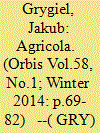

|
|
|
|
|
| Publication |
2013.
|
| Summary/Abstract |
Gnaeus Julius Agricola (40-93 AD) is a man for our times. Facing the capriciousness of imperial power, he, a successful provincial Roman governor, chose to withdraw from public administration. Yet, by protecting his family, Agricola did not shirk politics. On the contrary, he retreated to the founding cell of any polity, the family, which buttresses and at the same time limits the state. By doing so, Agricola reached greatness despite living under bad emperors.
|
|
|
|
|
|
|
|
|
|
|
|
|
|
|
|
| 2 |
ID:
131918
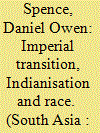

|
|
|
|
|
| Publication |
2014.
|
| Summary/Abstract |
This article examines the colonial legacies in the development of the Indian and Pakistani navies following Independence. As both navies struggled with problems of indigenising their forces, Britain endeavoured to maintain its regional hegemony by extending the professional dependency of both. The influence of imperial ideologies and racial discourses of power on these relationships and on Indian naval identity caused India's and Pakistan's navies to evolve in different directions, as did Cold War geopolitics and civil-military relations. By analysing the challenges faced by India in achieving strategic independence, this article widens existing debates surrounding the neo-colonialism of Indian governance and education during the Nehruvian period, the reinvigoration of Empire and the limits of British imperial power after World War II.
|
|
|
|
|
|
|
|
|
|
|
|
|
|
|
|
| 3 |
ID:
129404
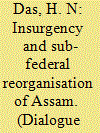

|
|
|
|
|
| Publication |
2014.
|
| Summary/Abstract |
From the beginning of human existence people have moved in groups in search of food and also for ensuring security. Groups have expanded into ethnic communities with separate identities, then into races and ultimately into nations. People have come to distinguish themselves by the colour of their skins; the different languages they speak, faith, religion or regions they inhabited. As civilization advanced, people
became more attached to one community or another. Particular territories were carved out as the habitat of particular communities or races. Even within universal empires sub-divisions became discernible. Sometimes racial conflicts arose. The imperial powers had to intervene and mediate in such disputes
|
|
|
|
|
|
|
|
|
|
|
|
|
|
|
|
| 4 |
ID:
000922
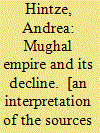

|
|
|
|
|
| Publication |
Hampshire, Ashgate, 1997.
|
| Description |
xii, 299p.hbk
|
| Standard Number |
0860786110
|
|
|
|
|
|
|
|
|
|
|
|
Copies: C:1/I:0,R:0,Q:0
Circulation
| Accession# | Call# | Current Location | Status | Policy | Location |
| 040384 | 954.025/HIN 040384 | Main | On Shelf | General | |
|
|
|
|
| 5 |
ID:
095054
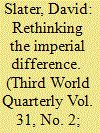

|
|
|
|
|
| Publication |
2010.
|
| Summary/Abstract |
In this article the imperial is envisaged in terms of a multifaceted terrain of analysis that can encourage us to pose a number of interrelated questions. Five issues are identified for discussion. First, the differential way cultural studies and Marxist political economy approaches interpret the imperial present is assessed. Second, the why and how of imperial power are subjected to debate. Third, the overlapping inside and outside of imperialism are identified and analysed. Fourth, the newness of today's 'new imperialism' is highlighted and critically examined and, fifth, in relation to the evolving geopolitics of knowledge, some reflections are offered on the significance of the imperial in global times. The context is predominantly provided by US-Latin American encounters.
|
|
|
|
|
|
|
|
|
|
|
|
|
|
|
|